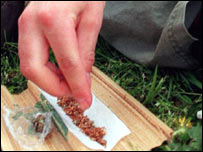
Cannabis has been reclassified to let police deal with heroin and crack
|
Arrests for cannabis possession have dropped by a third after the drug was downgraded, government estimates show.
Cannabis was reclassified as a Class C drug alongside anabolic steroids and some tranquillisers in January.
The aim was to save some 180,000 hours of police time a year, so they could tackle more dangerous drugs, such as crack and heroin.
Possessing cannabis is still a crime, but most of the time police seize the drug and give offenders a warning.
The figures were based on the first five months after the reclassification, and were submitted by 26 of the 43 forces in England and Wales.
But not everybody sees the new, more tolerant policy as an effective way of dealing with drug problems.
'Not complacent'
The government's former drug tsar, Keith Hellawell, accused the government of "encouraging" drug use among youths.
The Police Federation said the figures were encouraging, but added they were not complacent.
Home Office Minister Caroline Flint said: "Early estimates show that in the five months following cannabis reclassification, arrests for cannabis possession have dropped by a third.
"The police are spending less time arresting people for possession of cannabis and filling in the paperwork that goes along with it," she added.
This enables them to concentrate on the Class A drugs which cause most harm to society".
Ms Flint went on to say that according to the British Crime Survey, the number of young people using cannabis in 2003/04 was 24.8% - down from 25.8% the previous year and 28.2% in 1998.

